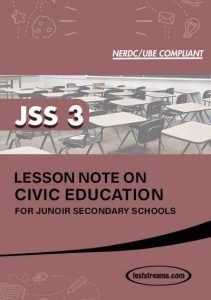This CIVIC EDUCATION Lesson Note was pulled from our book (Lesson Note on CIVIC EDUCATION for JSS3 MS-WORD); Compiled to serve as a reference material to help teachers draw out their lesson plan easier, saving you valuable time to focus on the core job of teaching.
The Lesson notes are based on the current NERDC curriculum (UBE compliant)
This CIVIC EDUCATION Lesson Notes Covers The Following Topics
1. THE CONSTITUTION
2. THE CONSTITUTION – THE COLONIAL NIGERIAN CONSTITUTION
3. FEATURES OF COLONIAL CONSTITUTION
4. CONSTITUTION (CONT’D)
5. THE CONSTITUTION: THE COLONIAL NIGERIAN CONSTITUTION (CONT’D)
6. POST 1960 CONSTITUTION: 1963 CONSTITUTION
7. POST 1960 CONSTITUTION – PRESIDENTIAL CONSTITUTION
8. POST 1960 CONSTITUTION – REPUBLICAN CONSTITUTION 1979
9. NATIONAL VALUES
10. RIGHT ATTITUDE TO WORK
11. COMMUNAL SERVICES
12. NEGATIVE BEHAVIOUR
13. DRUG ABUSE
14. EXAMINATION MALPRACTICE
15. ELECTION
16. IMPORTANCE OF ELECTION
17. ELECTORAL BODIES
18. FREE AND FAIR ELECTIONS
19. ELECTORAL MALPRACTICES IN NIGERIA
20. WAYS OF PREVENTING ELECTORAL MALPRACTICES IN NIGERIA
Sample note
Topic: The Constitution
Outline:
- Meaning of constitution
- Importance of having constitution
- Sources of constitution
- Importance of Nigerian constitution
What is a Constitution?
Constitution can be defined as a body of rules and principles according to which a country is governed. It is the basic law by which a political system operates. A Constitution is a fundamental and entrenched rules governing the conduct of an organization or nation state, and establishing its concept, character, and structure. It is usually a short document, general in nature and embodying the aspirations and values of its writers and subjects.
The constitution can also be defined as the organic and fundamental law of a nation or state, which may be written or unwritten, establishing the character and conception of its government, laying the basic principles to which its internal life is to be conformed, organizing the government, and regulating, distributing, and limiting the functions of its different departments, and prescribing the extent and manner of the exercise of sovereign powers.
The constitution expresses the powers exercised by the various levels of government. It limits the power of the government. Constitution can be defined as a body of agreed rules and principles according to which a country is governed. It is the basic law to which a political system operates.
Importance of Having a Constitution
- The primary function of a constitution is to lay out the basic structure of the government according to which the people are to be governed. It is the constitution of a country, which establishes the three main organs of the government, namely, the legislature, executive and judiciary.
- The constitution of a country not only defines the powers allotted to each of the three main organs, but it also significantly makes a clear demarcation of the responsibilities assigned to each of them. It effectively regulates the relationship between these organs as well as the relationship between the government and its people.
- Since the country’s constitution stands superior to all the laws framed within the territorial precincts of the country, any law enacted by the ruling government has to be in conformity with the concerned constitution. As such, the citizens would, in turn, be abiding by not just the law, but also working in sync with the demarcations of the constitution laid by the country.
- The constitution does not simply provide a recipe for an efficient government, but also deals with limitations on power. Since power corrupts and absolute power corrupts absolutely, a constitution is established to restrict the abuse of power by those who conduct governmental functions.
- The constitution of a particular country lays down the national goals which form the basic edifice on which the nation rests upon. For instance, the constitution of India has inscribed in it the primary facets of the nation which are democracy, socialism, secularism and national integration.
- A constitution, besides thrusting on the rights of the citizens of the concerned nation, also has embedded in it the duties that the citizens require to adhere to as well.
Sources of a Constitution
- Convention:This refers to the customs and traditions of a people which over time becomes generally acceptable norm in the society. In general, the constitution of a state is a summation of the totality of the custom and tradition of people in that state.
- Act of Parliament:This is a very important source of constitution of a state. Parliament in any state is the legal body can make and alter the laws of the state.
- The People:The singular fact that laws are made to suit people within a particular state presupposes that inputs of the people, via their representatives in parliament to the amendment of a constitution or in drafting new ones, need to be taken seriously.
- Precedence:This implies the ways and manners a particular thing is done over time within a period and which becomes widely accepted with time. This ultimately becomes part of the constitution.
- Constitutional Conferences/Constituent Assemblies:This is an assembly convened for the purpose of drafting new constitution or altering the existing one.
Importance of the Nigerian Constitution
- It is the legal document from whichevery institution in the country gets its validity.
- It contains all the fundamental rights of every Nigerian citizen (more of this below).
- The Constitution issupreme– this means that any law or any action which is inconsistent or incompatible with any of the provisions contained in the Constitution is null, void and of no effect.
- The Constitution sets out the powers of the 3 arms of Government – the Executive, the Legislature, and the Judiciary.
- The Constitution states the procedure that must be followed for the creation of a new State or for the boundary adjustment of an existing State (and Local Governments as well)
- The Constitution provides that before any international Treaty can be effective in Nigeria, it must be enacted into law by the National Assembly
Assessment
- State four importance of Nigeria constitution
- Name four sources of a constitution

Get the complete Lesson Note with more content at very affordable price. Lesson Note on CIVIC EDUCATION for JSS3 MS-WORD- PDF
![]()




